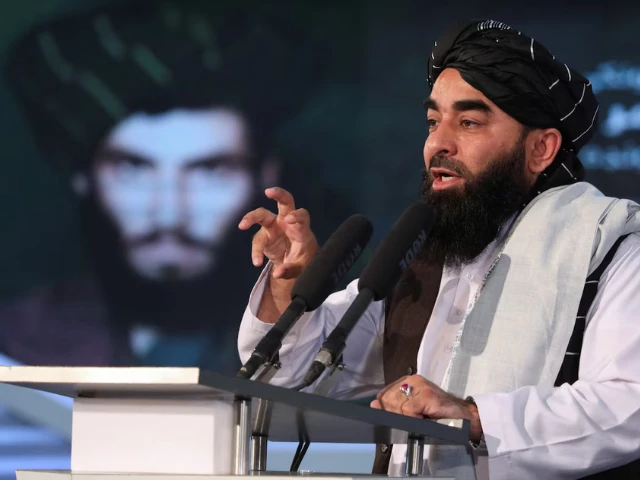The latest escalation along the Pakistan-Afghanistan border follows a series of militant attacks in Pakistan
Afghan Taliban Deputy Minister of Information and Culture and Spokesman Zabihullah Mujahid speaks during the death anniversary of Mullah Mohammad Omar, the late leader and founder of the Taliban, in Kabul, Afghanistan, April 24, 2022. REUTERS
A high-level Pakistani delegation led by the defense minister arrived in Doha, Qatar on Saturday to hold talks with the Afghan Taliban focusing on immediate measures to stop cross-border terrorism and restore peace along the Pakistan-Afghanistan border.
The Taliban delegation is led by the Islamic Emirate of Afghanistan’s defense minister, Mullah Mohammad Yaqoob “Mujahid”, and includes intelligence chief Mullah Abdul Haq Wasiq.
Zabiullah Mujahid, spokesman for the Islamic Emirate of Afghanistan, confirmed on his official X account that the delegation has left for Doha and called on his forces to refrain from new moves, despite reserving the right to respond to Pakistani attacks, in order to preserve the dignity and status of its negotiating team.
Read: Pakistan accepts the Afghan Taliban regime’s request for a 48-hour ceasefire
The Pakistani delegation landed around 2:00 PM PST, while the Taliban delegation arrived earlier to begin negotiations.
Pakistan’s Foreign Ministry emphasized that it is not seeking escalation, but urged the Taliban to honor their commitments to the international community and address Pakistan’s security concerns by taking verifiable action against terrorist entities, including the Foreign Afghan Khalq/Tehreek-e-Taliban Pakistan and the Foreign Afghan Hizb-ul-Armochhiande Liberenen Armochiande/Balyhiande. Pakistan also expressed appreciation for Qatar’s mediation efforts.
A high-level delegation from Pakistan, led by our Defense Minister, will hold talks with representatives of the Afghan Taliban in Doha today. The talks will focus on immediate measures to stop cross-border terrorism against Pakistan emanating from Afghanistan and restore…
— Ministry of Foreign Affairs – Pakistan (@ForeignOfficePk) 18 October 2025
The latest escalation along the Pakistan-Afghanistan border followed a series of militant attacks in Pakistan, including a suicide attack that killed seven Pakistani soldiers and wounded thirteen, prompting Pakistan to carry out airstrikes in Afghanistan.
According to Reutersthose clashes, which marked the worst violence along the 2,600-kilometer border since the Taliban took power in 2021, prompted Pakistan and Afghanistan to extend a 48-hour ceasefire from October 16 to facilitate talks.
Read more: Trump calls the conflict between Pakistan and Afghanistan ‘an easy one to solve’
The fighting involved Afghan Taliban forces, reportedly aided by Indian-linked elements of the outlawed Tehreek-e-Taliban Pakistan, and targeted several sectors, including Angoor Adda, Bajaur, Kurram, Dir, Chitral and Baramcha, in attacks aimed at facilitating militant infiltration into Pakistan.
Pakistan’s military claimed that over 200 Afghan Taliban fighters were killed, while twenty-three Pakistani soldiers were martyred, although Afghanistan reported fifty-eight casualties.
The cross-border violence also affected civilians, with Pakistan closing border crossings and Afghanistan’s national cricket team pulling out of a tournament in Pakistan following the airstrikes.
The clashes underscore Pakistan’s long-standing demand that the Afghan Taliban rein in militants operating from Afghan territory, despite ongoing diplomatic engagement.



